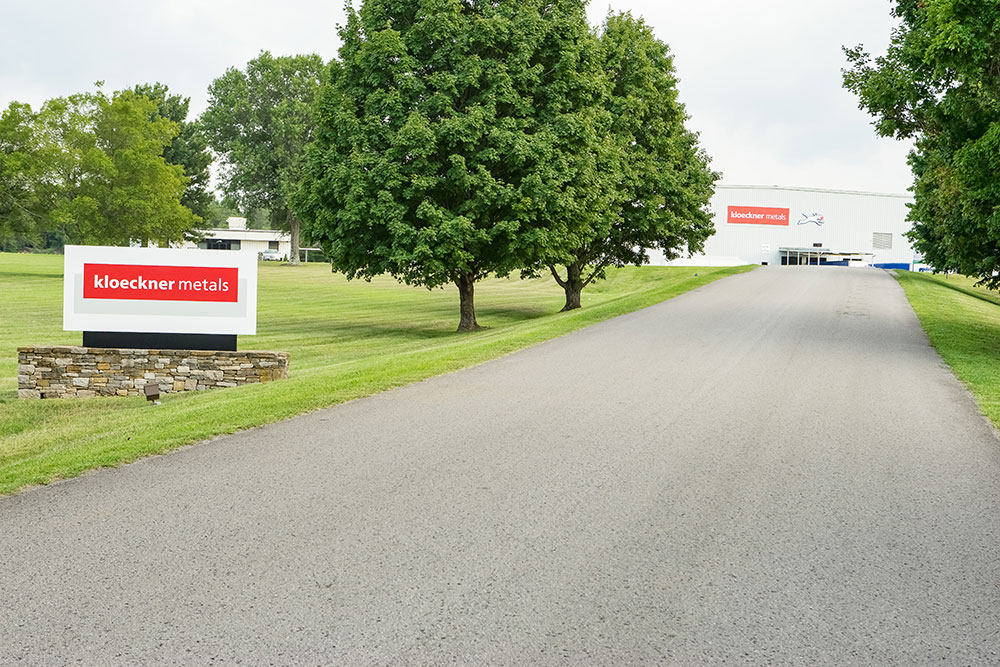
Kloeckner Metals Corporation, founded in 1906, is one of the largest metals manufacturing, supply and service companies in North America.
By Don Eberly, Kloeckner Metals Corporation Representative
The U.S. economy is thriving, and the global metals industry is growing by 2.7-3.4% year over year. Existing companies are reopening shuttered mills, expanding current plants, and building new ones, while new companies are entering the industry.
As competition heats up, companies must seek new ways to heighten efficiencies and control costs. Leaders with Kloeckner Metals Corporation, one of the largest metal service centers in North America, are making strides to do just that.

Matt Meyer, Vice President of Digital Innovation, Kloeckner Metals Corporation, is guiding a shift in Industry 4.0 to expand technology innovation and automation.
“The metals industry is a commodity-driven market and industry. There are low barriers to entry and thousands of competitors. The way to succeed is to find efficiency,” explains Matt Meyer, Vice President of Digital Innovation with Kloeckner Metals Corporation.
However, he says, “The traditional ways to derive efficiency have been exhausted. Many in the manufacturing and distribution fields have spent years trying to drive down costs. We’ve focused on the factory to understand and improve workflow. Now, we’re bringing technology to bear in a much bigger way.”
Kloeckner Metals Corporation believes implementing Industry 4.0 and digitalization will keep competitiveness high. Today, the company puts its focus on front-office exchanges and interactions with its supply base, not just its efforts to move and process metal. Meyer calls the strategy a “true paradigm shift.”
The company traditionally tweaked manufacturing processes to generate efficiencies, but digitalization expands its focus to the entire supply chain. This enables Kloeckner Metals personnel to extract efficiencies from the shop floor, shipping and receiving, and in inventory tracking and reordering.
McKinsey & Company, a global management consulting firm, defines Industry 4.0 as “the next phase in the digitalization of manufacturing, driven by four disruptions:
Kloeckner takes a simpler view. “If you Google Industry 4.0, it’s all about the Internet of Things (IoT), machines talking to machines,” states Meyer. “We are pragmatic in our definition because [in the metals industry] there is a gap between where we are today and a perfect world of Industry 4.0.”
Kloeckner sees Industry 4.0 as supply chain automation. The company examines supplier, customer, and facility needs, then implements technology designed to improve uptime, drive efficiency, increase transparency, and understand metrics.
This shift can have long-lasting, positive effects across many industries such as for automotive manufacturers, appliance manufacturers, the heavy trucking sector, the oil and gas industries, construction industry, for steel building materials, and those working in material handling technologies, among others.
The German distributor has been leveraging technology to improve operations for its more than 45 U.S. locations and 170-plus worldwide. One key aspect in 2017 involved employing RFID and Bluetooth technology at a Tulsa, Oklahoma, facility to keep better tabs on materials.
The move solved one of the plant’s challenges. The 166,000-square-feet facility houses thousands of skids or SKUs of material, which are constantly on the move. This made materials difficult to locate.
After putting sensors in the factory and Bluetooth tags on products, finished goods, and raw material, workers now locate SKUs within eight short minutes, cutting time dramatically.
The project also led to other efficiencies. The company once pre-staged truckloads for pickup to allow time to locate materials. The new ability to quickly find skids eliminates pre-staging. “We now can get multiple, additional trucks through the plant on any given day, and have reduced unnecessary labor and overtime hours,” he says.
The project was not without challenges. The reflectivity of metal interfered with wireless signals. So, Kloeckner Metals worked with a partner develop a custom Bluetooth tag. Next steps involved continually optimizing the software to achieve required levels of accuracy.
Kloeckner also automated delivery pick-up receipts. The new process takes just minutes, versus 30-45 minutes originally, cutting out the manual process altogether.
Meyer would also like to automate outgoing loads to eliminate manual checks of truckloads before departure. “We’d like to employ a red light/green light, so drivers know if the light is green, the load matches what is on the manifest.”
Kloeckner has also extended efforts to drive efficiencies through RFID to its customer base, with several active programs in place and developmental projects underway. Working in partnership with customers to supply material pretagged with RFID allows them to realize significant time savings at the receiving dock and beyond. The ability to follow raw materials through the manufacturing plant to the point-of-use allows a level of transparency and automation that creates substantial efficiency gains in the supply chain.
Innovation encompasses more than developing cutting-edge products. Innovation also must be part of the business itself. This requires companies to reimagine business processes, asset management, and customer relationships, according to Meyer.
Kloeckner Metals began its business process renaissance by automating sales processes or procurement operations. Success in this area allowed the company to continue to move closer to Industry 4.0.
The company automated the inside sales role first, whereas Kloeckner digitalized the contractual side of the job, which Meyer describes as “…high-volume, repetitive order entry.”
“Now, these orders are automated,” says Meyer. “There are far fewer instances of calling customers to change sizes or further define the specific delivery.”
The move frees sales staffs to monitor customer-provided forecasts and incorporate that data into their own forecasts. “This allows us to leverage our sales teams’ considerable experience and expertise,” he says.
On the procurement side, employees were scouring through printed reports, spreadsheets and other materials to determine purchases. Kloeckner Metals addressed this bottleneck by building an Inventory Planning Tool into its ERP. Meyers describes it as a manage-by-exception system driven by parameters set by buyers.
The system defines an optimum inventory level; then, personnel manage the exceptions within those parameters. Eventually, Kloeckner leadership plans to automate optimization at the SKU level to put machine learning behind these parameters. The goal is to build a system that completely automates ordering, with the purchasing team focused on exceptions, mill relationships and commercial opportunities.
“Even with automation, there is still a lot of work for the buyer to do in working with suppliers, transportation and production,” Meyer says.
As internal processes are refined, Kloeckner Metals looks to further expand technology innovation to suppliers and customers. The company recently automated mill certifications, which once arrived via email and were manually indexed.
“Several of our top suppliers now participate in this automation,” says Meyer. “It’s fast, efficient and accurate. We no longer have a backlog of two weeks; things happen in seconds.”
Kloeckner supplies customers with greater transparency through the Kloeckner Connect platform. This software tool allows customers to check on the status of orders; see efficiencies in their supply chains; and communicate with dedicated account managers in real time.
Kloeckner Metals also asks customers to partner with them in Electronic Data Interchange (EDI) reporting. EDI operates on a robust, defined set of communications protocols with which other systems can communicate for seamless data exchange. Customers obtain information and data through the Kloeckner Connect portal and place orders from their ERP directly to Kloeckner’s ERP system via EDI.
The final phase of Kloeckner’s charge toward Industry 4.0 will involve the need to sensorize equipment to better understand machine failure points and predict downtime, and to enable machines to have dialog.
“Eventually, we’d like to use technology to allow one process to automatically drive the next process in the supply chain,” he says. “That’s really the goal of the intelligent factory– machines with the capability to talk to one another.” Learn more: www.kloecknermetals.com.
Scott Ellyson, CEO of East West Manufacturing, brings decades of global manufacturing and supply chain leadership to the conversation. In this episode, he shares practical insights on scaling operations, navigating complexity, and building resilient manufacturing networks in an increasingly connected world.